We have hosted quite a few people as collaborators, summer project students and undergraduate honours students. These are mostly for less than six months and so, with a few exceptions, don't appear below in the list of alumni. However, you can read a bit about what they all did in this spreadsheet . Please let Geoff Barton know if you are missing from this list! Thanks!
The people below all spent time with us working towards their MSc or Ph.D./D.Phil. or as postdoc research assistants or other jobs. Here, you can read a bit more about what they did in the group and where they moved to afterwards. The info here might be out of date for some people but most have LinkedIn entries which they keep up to date!
Javier first joined us to work on a research project that applies human variants from population genetics studies to identify key residues in protein domains. He was a second year Masters' student at the Universitat Pompeu Fabra, Barcelona Spain and finished his project in June 2020.
Javier then won a prestigious BBSRC EASTBIO studentship to work on his Ph.D. about Computational Methods for the Characterisation and Evaluation of Protein-Ligand Binding Sites.
During the Masters' and Ph.D. Javier published 5 papers (so far) as first author!
In his spare time Javier is a crazy fast runner who also promotes the drinking of really good coffee though usually not at the same time!

Javier joined us on 9th September 2019.
Javier successfully defended his Ph.D. thesis on 2nd May 2025 - his Ph.D. examiners where David Hoksza from Charles University Prague and Alessio Ciulli.
From 1st March-30th June 2025, Javier worked as a Research Assistant with us, refining LIGYSIS-web and publishing papers!
He will start a postdoc position at UCL in August 2025 (more details soon)...
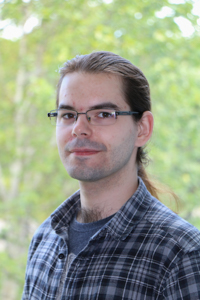 Mateusz has joined the group after obtaining a Masters' in Physics at the University of
Dundee. He has previously worked with us as a summer student developing new server-side
technology to support the Dundee Resource for Sequence Analysis and Structure Prediction.
He'll be continuing this work with both the Jalview and Dundee Resource teams.
Mateusz has joined the group after obtaining a Masters' in Physics at the University of
Dundee. He has previously worked with us as a summer student developing new server-side
technology to support the Dundee Resource for Sequence Analysis and Structure Prediction.
He'll be continuing this work with both the Jalview and Dundee Resource teams.
Mateusz joined us on 1st July 2019.
Mateusz moved on to a new position at Genentech on 1st September 2024.
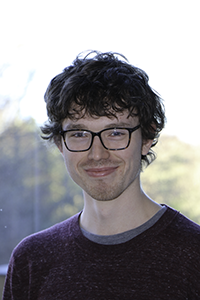 Matt has joined the group as part of a collaborative project with Gordon Simpson, funded by the
Global Challenges Research Fund. He originally studied for a degree in Biochemistry at the
University of Sheffield, before starting a PhD split between wet and dry lab, again at the
University of Sheffield.
Matt has joined the group as part of a collaborative project with Gordon Simpson, funded by the
Global Challenges Research Fund. He originally studied for a degree in Biochemistry at the
University of Sheffield, before starting a PhD split between wet and dry lab, again at the
University of Sheffield.
Part way through his PhD he had an epiphany, realised that bioinformatics was his true calling, and vowed never to pick up a pipette again. His work in the Barton/Simpson groups focuses on the use of trendy long read sequencing technologies to study RNA processing in Arabidopsis and neglected crop species.

Matt joined us on 19th November 2018.
After a very successful four and a half years in the collaboration with Gordon Simpson, Matt left on 5th May 2023 to take up an Alexander von Humboldt Research Fellowship.
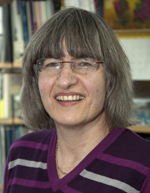 Suzanne has joined us as training and outreach officer who will focus on developing manuals,
courses and web presence for Jalview and our other
services such as Jabaws, Jpred and Kinomer, that form the Dundee Resource for Sequence Analysis
and Structure Prediction (DRSASP).
Suzanne has joined us as training and outreach officer who will focus on developing manuals,
courses and web presence for Jalview and our other
services such as Jabaws, Jpred and Kinomer, that form the Dundee Resource for Sequence Analysis
and Structure Prediction (DRSASP).
After a first degree in Chemistry at the University of Southampton, she worked at the Institute of Food Research (Norwich) before study for a PhD in MRI at the University of Cambridge. She was awarded a Herchel Smith PhD Fellowhip (1987) from University of Cambridge, and a Career Re-entry Fellowship from the Wellcome Trust (2007). She has published over 30 scientific research papers, 19 as a principle author. Several of Suzanne's MRI images have been published on textbooks, displayed in the Wellcome Images collection and hung in a variety of exhibitions including Vision of Discovery exhibition (2009 and 2013). Suzanne is also a Director and Chair of a UK charity "Children First Uganda" that supports the most vulnerable children in Uganda.


Suzanne joined the group on 5th Feb 2014.
After nine years in the group developing a huge suite of training videos, schools' materials and championing other outreach activities, Suzanne moved to a position in the Division of Computing at the University of Dundee at the end of February 2023.
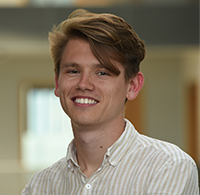 Maxim studied for a B.Sc. with Honours in Molecular Genetics at the University of
Dundee, with a thesis focusing on characterising mutations of PML and PML-RARa bodies
derived from relapsed patients with refractory acute promyelocytic leukaemia. Throughout
his bachelor’s degree, he was exposed to multiple disciplines in life sciences, from
gene regulation and expression to structural biology.
Maxim studied for a B.Sc. with Honours in Molecular Genetics at the University of
Dundee, with a thesis focusing on characterising mutations of PML and PML-RARa bodies
derived from relapsed patients with refractory acute promyelocytic leukaemia. Throughout
his bachelor’s degree, he was exposed to multiple disciplines in life sciences, from
gene regulation and expression to structural biology.
After twiddling his fingers working in wet-lab based projects, he decided to make the big jump to computation biology with a keen interest in data sciences and expanding his programming skills. During one of his project rotations, he worked with Stuart MacGowan in the Barton Group to explore human population genetic variant data in TPR domains of O-GlcNAc transferase (OGT). This defined his Wellcome Trust Funded PhD project with us in the Barton group.
In his spare time, he enjoys gardening, anything science fiction related, and board games. Other times he plays the saxophone, and composes electronic music, as well as creating digital art and plenty of photography.
Maxim joined us on 10th September 2018.
Maxim successfully defended his Ph.D. thesis on Friday 13th May 2022. His examiners were Profs Mark Wass (University of Kent) and Alessio Ciulli. In March 2023 he moved to the AlphaFoldDB team at EMBL-EBI!
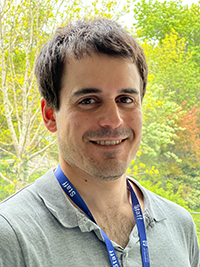 Mikel studied agricultural engineering at the Public University of Navarre, and did his
Ph.D. at the James Hutton Institute and University of Dundee, studying the meiotic
recombination of barley under heat stress. After this, he continued working at the James
Hutton Institute as a postdoc, investigating recombination in different barley mutant
and natural variant populations. He joined the Barton group in January 2022 on a
short-term position as part of a joint project with Davide Bulgarelli’s group and The
Data Analysis Group continuing the ongoing research of identifying plant genes shaping
the microbiota composition of the barley rhizosphere.
Mikel studied agricultural engineering at the Public University of Navarre, and did his
Ph.D. at the James Hutton Institute and University of Dundee, studying the meiotic
recombination of barley under heat stress. After this, he continued working at the James
Hutton Institute as a postdoc, investigating recombination in different barley mutant
and natural variant populations. He joined the Barton group in January 2022 on a
short-term position as part of a joint project with Davide Bulgarelli’s group and The
Data Analysis Group continuing the ongoing research of identifying plant genes shaping
the microbiota composition of the barley rhizosphere.
Mikel joined us on 1st January 2022 and after making a great contribution to the project, moved on on 17th May 2022.
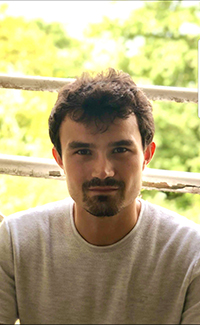 Arnaud studied for a BSc in pure Maths at the University of Lille, France. After 2 years
towards a degree in Computer Science, he switched to an MSc in Bioinformatics in 2019 to
apply and extend his programming skills while learning about biological systems,
molecular genetics & dynamics and even machine learning applied to biology research.
He is in the second year of his Masters' and was with the group until July 2021. He
joined the team to work on a Jalview development project which added support for the
3D-Beacons network of protein model databases.
Arnaud studied for a BSc in pure Maths at the University of Lille, France. After 2 years
towards a degree in Computer Science, he switched to an MSc in Bioinformatics in 2019 to
apply and extend his programming skills while learning about biological systems,
molecular genetics & dynamics and even machine learning applied to biology research.
He is in the second year of his Masters' and was with the group until July 2021. He
joined the team to work on a Jalview development project which added support for the
3D-Beacons network of protein model databases.
When not in front of his computer Arnaud trains for and competes in for track and field events, especially 400m hurdles. Aside from that he likes anything space related, various science-fiction books, and is currently learning about chess !
Arnaud joined us on 1st February 2021 and returned to his studies in France in July 2021.
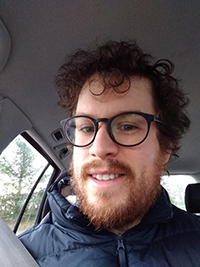 Max came to Dundee to do his Ph.D. at the University of Dundee to work on identifying
genes for barley resistance to a fungal disease called rhynchosporium. During his Ph.D.
he got a chance to do a bit of everything from coding to cloning with plenty of strolls
through fields of grain. He decided that bioinformatics was what he liked best and so
after a post-doc with Prof. Robbie Waugh analysing barley transcriptomics data he now
works on a BBSRC funded collabration between the Davide Bulgarelli and Geoff Barton
groups using a variety of methods and tools to understand the genetics behind plant and
soil microbiota interactions. In his spare time, he enjoys playing the fiddle, cooking
curries and cold-water swimming.
Max came to Dundee to do his Ph.D. at the University of Dundee to work on identifying
genes for barley resistance to a fungal disease called rhynchosporium. During his Ph.D.
he got a chance to do a bit of everything from coding to cloning with plenty of strolls
through fields of grain. He decided that bioinformatics was what he liked best and so
after a post-doc with Prof. Robbie Waugh analysing barley transcriptomics data he now
works on a BBSRC funded collabration between the Davide Bulgarelli and Geoff Barton
groups using a variety of methods and tools to understand the genetics behind plant and
soil microbiota interactions. In his spare time, he enjoys playing the fiddle, cooking
curries and cold-water swimming.
Max joined us on 1st September 2020.
Max moved on in January 2022 to a job with the company Xelect who develop Genetic Solutions for Aquaculture.
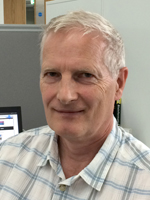 Mungo has joined the Jalview team as a software
developer to help with new feature development and architectural enhancements.
Mungo has joined the Jalview team as a software
developer to help with new feature development and architectural enhancements.
A degree in Maths at Cambridge University led on to a career in software development, ranging from commmercial systems to healthcare to financial services, with a stint of lecturing in Bulawayo, Zimbabwe, as a digression. An MSc at Edinburgh University in Knowledge Based Systems was followed by time spent applying expert system and neural network technologies in industry. Latterly he has led teams of Java developers, and developed special interests in application security, development best practice and software quality assurance. He is looking forward to the challenge of embarking on a new career in Bioinformatics.
Outside of work, he relaxes by playing the violin or saxophone, or enjoying long bike rides in the country lanes of Perthshire.
Mungo joined us on 1st September 2014
After making huge contributions to the Jalview project, Mungo retired at the end of February 2021 to take his many non-programming jobs forward.
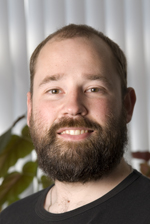 Nick, like Marek (below), has also made the transition from astronomy to biology. Nick
studied for an MSci in physics at the University of Bristol, before completing his
astrophysics Ph.D. at the University of Leicester. Nick has had postdoc positions on
three continents (Europe, USA and Asia) culminating with a UK-China Fellowship for
Excellence with the Institute for High Energy Physics in Beijing, China, before joining
the Barton Group in 2009. Nick has always had a strong interest in biology (despite
studying physics) and over the past few years has enjoyed working in a field with more
immediate relevance to the world! Nick enjoys watching films, falconry, and all things
football (he is a lifelong Liverpool fan despite not coming from Liverpool!).
Nick, like Marek (below), has also made the transition from astronomy to biology. Nick
studied for an MSci in physics at the University of Bristol, before completing his
astrophysics Ph.D. at the University of Leicester. Nick has had postdoc positions on
three continents (Europe, USA and Asia) culminating with a UK-China Fellowship for
Excellence with the Institute for High Energy Physics in Beijing, China, before joining
the Barton Group in 2009. Nick has always had a strong interest in biology (despite
studying physics) and over the past few years has enjoyed working in a field with more
immediate relevance to the world! Nick enjoys watching films, falconry, and all things
football (he is a lifelong Liverpool fan despite not coming from Liverpool!).
Nick was originally part of the Data Analysis Group (DAG) a sub-group of the Barton Group. He was supported by funding from the Scottish Universities Life Science Alliance (SULSA) as part of our venture to carry out innovative data analysis for high data content/high-throughput techniques such as proteomics mass-spectrometry and next generation DNA sequencing.
On 1st July 2012 Nick moved onto a joint BBSRC grant between Geoff Barton and Gordon Simpson to work on non-coding RNA in Arabidopsis.


Nick joined the Group on 1st May 2009
At the end of March 2019, Nick moved to take up a team leader position with BioSS based at the James Hutton Institute Aberdeen.
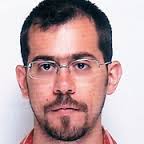 Kimon has joined the group as part of our BBSRC funded collaboration with Gordon Simpson.
Kimon has joined the group as part of our BBSRC funded collaboration with Gordon Simpson.
Kimon studied Biology at the National and Kapodistrian University of Athens, eventually realizing that computer programming offered him a much more satisfying experience than pipettes and colourless microdroplets. He swung away from the wet lab with an MSc in Bioinformatics at the same university. Leaving the sun behind, he completed a PhD in Bioinformatics at King's College London, and then moved across the UK, further away from any hint of the unbearable Mediterranean warmth, to join the Barton Group as a postdoc bioinformatician crunching transcriptomic data.
Throughout most of his life, Karate has kept Kimon sane and healthy, both through training and teaching. Other activities include photography, music, cycling, diving and an insatiable appetite for building LEGO.
Kimon joined us on 1st October 2015
At the end of May 2018, Kimon moved on to pastures new on the Continent of Europe!
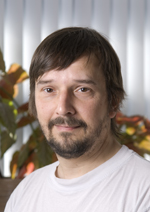 Marek is a member of the Data Analysis Group (DAG). He was originally supported by
funding from the Centre for Gene Regulation
and Expression as part of our joint venture to carry out innovative data
analysis for high data content/high-throughput techniques such as proteomics
mass-spectrometry and next generation DNA sequencing.
Marek is a member of the Data Analysis Group (DAG). He was originally supported by
funding from the Centre for Gene Regulation
and Expression as part of our joint venture to carry out innovative data
analysis for high data content/high-throughput techniques such as proteomics
mass-spectrometry and next generation DNA sequencing.
Marek was born and educated in Poland. He graduated from the Jagiellonian University in Krakow and completed his PhD in astrophysics at N. Copernicus Centre in Warsaw. He moved to The University of Durham in 2000 as a postdoc and stayed there until 2009 in a succession of research and teaching positions. His main interest there was weird astrophysical objects: black holes and neutron stars. 2009 marked a dramatic change in his career: switching to Bioinformatics. One huge step for a man!


Marek joined the DAG on 23rd March 2009.
2018: Marek is still here in the DAG, I have just moved him to Barton Group Alumni since the DAG is now an independent group!
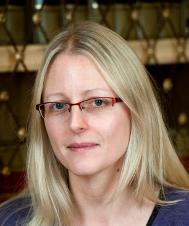 Kira joined the group on 1st October 2015 as part of our BBSRC funded collaboration with
Gordon Simpson. On
1st October 2016 she moved to a new position with the Jalview
Team.
Kira joined the group on 1st October 2015 as part of our BBSRC funded collaboration with
Gordon Simpson. On
1st October 2016 she moved to a new position with the Jalview
Team.
After a first degree in Maths and Computation at the University of Oxford, and an MSc in Operational Research at the University of Lancaster, Kira spent 8 years working as a software developer and team lead, working on projects ranging from staff and production scheduling, internet traffic simulations, geographical information systems, and machine vision for inspecting carpets and sorting mushrooms (not at the same time). Following an MSc and PhD in Neuroinformatics at the University of Edinburgh, and a postdoc working on an EU cognitive robotics project, she decided it was time to swap artificial life forms for real ones by joining the Barton group.
In her free time she can be found 'relaxing' in Body Combat classes, pottering around the garden, or tracking down remote branches of her family tree.



Kira joined the group on 1st October 2015.
On 5th March 2018, Kira moved on to a position with the company Synpromics at Edinburgh.
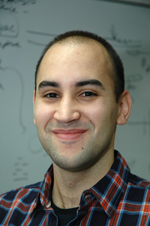 Fábio joined us as Ph.D. student on the Wellcome Trust Ph.D. programme in September
2013.
His project was to study the impact of genetic variation on protein structure and
interfaces. He submitted his Ph.D. in August 2016 and then became a Research Assistant
in the group.
Fábio joined us as Ph.D. student on the Wellcome Trust Ph.D. programme in September
2013.
His project was to study the impact of genetic variation on protein structure and
interfaces. He submitted his Ph.D. in August 2016 and then became a Research Assistant
in the group.
Before joining the group, Fábio obtained his B.Sc. in Biochemistry and his M.Sc. in Molecular Genetics and Biomedicine at the Universidade Nova de Lisboa. Getting more interested in programming and databases, Fábio shifted to bioinformatics joining the group of Prof. Ludwig Krippahl, where he worked on correlated-mutations and protein-protein docking.
When he is away from the computer, Fábio can be found at the swimming pool or most likely at the music room, where he dives into his piano improvisation.
Fábio joined the Group on: 1st September 2013.
Fábio successfully defended his Ph.D. Thesis at the end of 2016. His examiners were David Jones from (UCL) and Helen Walden (Dundee). Since October 2016, Fábio has been working on the BBSRC funded Dundee Resource project which includes JPred and the JABAWS webservices.
At the beginning of January 2018, Fábio moved on to a staff position working in Rodrigo Lopez's web production team at the European Bioinformatics Institute.
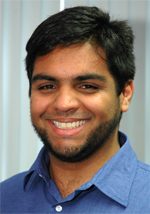 Thiago joined the group as a Ph.D. student on the CAPES scheme from Brazil. Thiago did
his bachelor's (2010) and M.Sc. (2012) in Biophysics at the Biophysical Institute Carlos Chagas Filho.
His Ph.D. is funded by the School of Life
Sciences and the Brazilian Agency CAPES. His
initial project is to study protein O-GlcNAcylation and then build an efficient and
accurate substrate predictor for this reaction which will combine data from Daan Van Aalten's
Group with the expertise in the Barton Group on Neural Network classifiers.
Thiago joined the group as a Ph.D. student on the CAPES scheme from Brazil. Thiago did
his bachelor's (2010) and M.Sc. (2012) in Biophysics at the Biophysical Institute Carlos Chagas Filho.
His Ph.D. is funded by the School of Life
Sciences and the Brazilian Agency CAPES. His
initial project is to study protein O-GlcNAcylation and then build an efficient and
accurate substrate predictor for this reaction which will combine data from Daan Van Aalten's
Group with the expertise in the Barton Group on Neural Network classifiers.
Thiago joined the Group on 5th November 2012.
Thiago successfully defended his Ph.D. Thesis in December 2016. His Ph.D. Examiners were Andrew Martin (UCL) and David Martin (Dundee).
Thiago took up a post-doc position in the Dieterich Lab in October 2017.
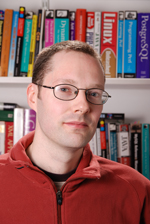 Chris is Senior Bioinformatics Research Officer and founder member of the Data Analysis
Group. Like former Group member Ian Overton, Chris previously worked in Simon Hubbard's
group at Manchester. Chris found the attraction of Dundee too great to miss, he dragged
his family along with him, although his wife was happy to be back in Scotland!
Chris is Senior Bioinformatics Research Officer and founder member of the Data Analysis
Group. Like former Group member Ian Overton, Chris previously worked in Simon Hubbard's
group at Manchester. Chris found the attraction of Dundee too great to miss, he dragged
his family along with him, although his wife was happy to be back in Scotland!
Chris left the bench after a traumatising Ph.D. and has been "doing" Bioinformatics ever since. In that time he has worked on protein-protein interface prediction, homology modelling, prion protein structure analysis and various aspects of proteomics.
Chris joined the Group to forge links between the Barton Group and wet-lab researchers in the School of Life Sciences. He worked on protein structure prediction and proteomics, before being the first to do deep analysis of Next Generation DNA sequencing data in Dundee in collaboration with Gyorgy Hutvagner. He then became the founding member of the Data Analysis Group (DAG) and from March 2011 has worked primarily on a Wellcome Trust Funded collaboration with Irwin McLean. In March 2014 he returned full-time to the Data Analysis Group but will maintain his involvement with the Centre for Dermatology and Genetic Medicine (DGEM).


Chris joined the Group on 1st Feb 2006. He moved on to a PI position at the Leverhulme Research Centre for Forensic Science on 1st September 2017. In summer 2021 Chris moved to the Health Informatics Centre in the Medical School at Dundee and was appointed a Senior Lecturer in Health Informatics in February 2022.
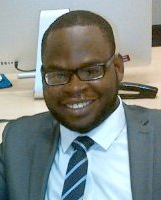 Charles Joined the Jalview team on 1st October
2014 as a software developer to help with new feature development and architectural
enhancement.
Charles Joined the Jalview team on 1st October
2014 as a software developer to help with new feature development and architectural
enhancement.
Charles (a.k.a Tochukwu) obtained a Bachelor's degree in Electrical/Electronics Engineering from Nigeria, and then worked for a software company in Nigeria for about two years before deciding to proceed for his master's studies in Software Engineering at the University of Southampton, UK in 2012.
Immediately after his masters he moved to Aberdeen to work with the dot.rural research hub at University of Aberdeen as a Semantic web developer, a move which caused his friends to tease that he had become an extremist by moving from the extreme South to the extreme North of the UK!
Outside work, Charles enjoys chilling with friends, watching sci-fi movies, chess, badminton and Disk Jockeying"
Tochukwu (Charles) joined the group on 1st October 2014, then moved on to a position in Mike Sternberg's group at Imperial College London, on 1st July 2017.
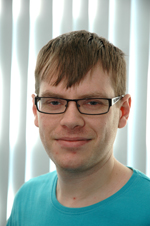 Joe joined as a postdoc bioinformatician working with the Genomic Sequencing Unit (GSU) at Dundee.
Having grown up in Hampshire, he's been slowly working his way up the United Kingdom.
After doing a bachelor's degree in biochemistry at the University of Nottingham, Joe decided to
unleash his inner nerd to get as far away from lab equipment as possible, so went on to
do a masters degree and a Ph.D. in bioinformatics at the University of Leeds.
Joe joined as a postdoc bioinformatician working with the Genomic Sequencing Unit (GSU) at Dundee.
Having grown up in Hampshire, he's been slowly working his way up the United Kingdom.
After doing a bachelor's degree in biochemistry at the University of Nottingham, Joe decided to
unleash his inner nerd to get as far away from lab equipment as possible, so went on to
do a masters degree and a Ph.D. in bioinformatics at the University of Leeds.

Joe joined the Group on 1st March 2013, then moved on to a position at The University of St Andrews on 18th November 2016. Since then he has moved to Mirador Analytics. See Joe's LinkedIn profile for more details.
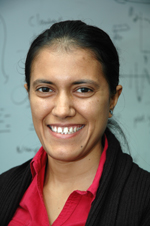 Reema is working as a postdoc with Pauline Schaap's
group in collaboration with us on the analysis of transcriptomics data in
Dictyostelium and related organisms.
Reema is working as a postdoc with Pauline Schaap's
group in collaboration with us on the analysis of transcriptomics data in
Dictyostelium and related organisms.
Reema completed her Masters in Bioinformatics from CCS Haryana Agricultural University. She then joined a bioinformatics research project at the Indian Council of Medical Research. After completing two years, she registered for a Ph.D. in "Computational Biology and Bioinformatics" at Jawaharlal Nehru University in 2009.

Reema joined the Team on 15th October 2013, then moved back to a job in India in November 2016 before taking up a new position at the University of Saskatchewan, Canada in April 2017.
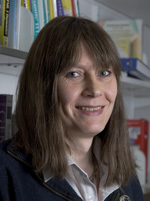 Pieta is a member of the Data Analysis Group (DAG) a sub-group of the Barton Group.
Pieta is supported by funding from the Centre
for
Gene Regulation and
Expression as part of our joint venture to carry out innovative data analysis
for high data content/high-throughput techniques such as proteomics mass-spectrometry
and next generation DNA sequencing.
Pieta is a member of the Data Analysis Group (DAG) a sub-group of the Barton Group.
Pieta is supported by funding from the Centre
for
Gene Regulation and
Expression as part of our joint venture to carry out innovative data analysis
for high data content/high-throughput techniques such as proteomics mass-spectrometry
and next generation DNA sequencing.
After working as a programmer and systems analyst for various finance sector companies, Pieta spent five years working as systems manager for the Parke-Davis Neuroscience Research Centre in Cambridge. She then returned to academia completing a PhD in mathematical biology at the University of Dundee in 2002. Since then she completed a Wellcome Trust Training Fellowship in Mathematical Biology, switching theoretical insects for the real thing. Pieta joined the Data Analysis Group in January 2009 from the SCRI where she developed methods for thermographic detection of plant stress.
Pieta joined the DAG on 1st January 2009
After over 7 years in the group and 18 years in Dundee, Pieta left in August 2016 for a new job at the Cancer Research UK Manchester Institute.
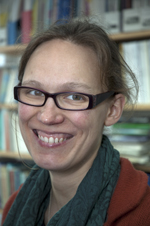 Gabriele is a visiting postdoc from the University of
Edinburgh. Her main research interests are to develop and apply
novel machine learning tools for the analysis of
high-throughput sequencing (NGS) data. She is currently
holding a Marie Curie Fellowship, jointly
in Dr Guido
Sanguinetti's group at the School of Informatics, and in Prof Adrian
Bird's lab at the Wellcome Trust Centre for Cell Biology.
Gabriele is a visiting postdoc from the University of
Edinburgh. Her main research interests are to develop and apply
novel machine learning tools for the analysis of
high-throughput sequencing (NGS) data. She is currently
holding a Marie Curie Fellowship, jointly
in Dr Guido
Sanguinetti's group at the School of Informatics, and in Prof Adrian
Bird's lab at the Wellcome Trust Centre for Cell Biology.
Previously, she completed a Ph.D. at the Max Planck Campus, Tübingen, Germany, working in the groups of Gunnar Rätsch, Bernhard Schölkopf and Detlef Weigel.
Gabriele began her visit to the Group during 2013. On July 1st 2018 she started as a tenure track PI in the Division of Computational Biology with a joint appointment at the University of Tubingen, Germany. More recently she won a prestigious Future Leader's Fellowship to support her work full-time in Dundee.
Gabriele was awarded tenure in March 2024 and continues to develop her research and teaching as Principal Investigator and Senior Lecturer in computational biology.
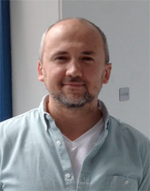 Alexey has joined us to do new research and development on JPred, Jabaws and other
resources that we have developed in the group. He is funded by BBSRC. Alexey has made
the move from high energy physics (with main focus on the Higgs boson discovery) to
bioinformatics after more than a decade working on the LHC project at CERN, Geneva,
Switzerland. Alexey received his Bachelor and Master degrees in Physics in 1999 and 2001
from the Novosibirsk State University (Russia), and his PhD in Physics in 2007 from the
University of Florida (USA).
Alexey has joined us to do new research and development on JPred, Jabaws and other
resources that we have developed in the group. He is funded by BBSRC. Alexey has made
the move from high energy physics (with main focus on the Higgs boson discovery) to
bioinformatics after more than a decade working on the LHC project at CERN, Geneva,
Switzerland. Alexey received his Bachelor and Master degrees in Physics in 1999 and 2001
from the Novosibirsk State University (Russia), and his PhD in Physics in 2007 from the
University of Florida (USA).
Outside work Alexey enjoys practicing and teaching yoga, training, running, and all things in Nature.


Alexey joined the group on 16th June 2014.
Alexey left the group on 20th March 2016 to pursue a new career as a data analytics consultant in London UK with the company Altius. More recently, Alexey moved to Kainos. See Alexey's LinkedIn profile for full details of his career.
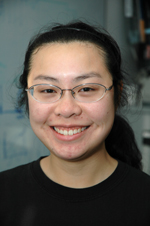 Nancy graduated in 2011 with a B.Sc. in Biochemistry (honours) with a Minor in
Mathematics from Lafayette College, USA. While interning in an academic physiotherapy
laboratory at the University of East London, she wrote a script to analyse data from
motor-evoked potentials. This experience sparked her interest in programming and
learning Python through a computational methods course at Lafayette. Wanting to apply
these methods in a biological context, Nancy did a rotation in her 4-Year Wellcome Trust
Ph.D. in The Barton Group aimed at refining protein secondary structure prediction by
incorporating natively unstructured regions. Her current project focuses on determining
new genomic features in the Saccharomyces cerevisiae genome with RNA-seq.
Nancy graduated in 2011 with a B.Sc. in Biochemistry (honours) with a Minor in
Mathematics from Lafayette College, USA. While interning in an academic physiotherapy
laboratory at the University of East London, she wrote a script to analyse data from
motor-evoked potentials. This experience sparked her interest in programming and
learning Python through a computational methods course at Lafayette. Wanting to apply
these methods in a biological context, Nancy did a rotation in her 4-Year Wellcome Trust
Ph.D. in The Barton Group aimed at refining protein secondary structure prediction by
incorporating natively unstructured regions. Her current project focuses on determining
new genomic features in the Saccharomyces cerevisiae genome with RNA-seq.
Outside of the School, she struggles to hold yoga poses and enjoys being part of the University Choir."
Nancy joined the Group on 1st September 2012. She defended her Ph.D. thesis on 22nd December 2015. Her Ph.D. examiners were Prof. Simon Hubbard (Manchester) and Dr David Martin (Dundee). Nancy is now pursuing a medical degree in the USA.
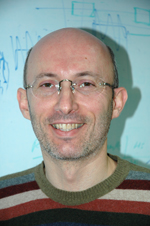 After a bachelor's degree in Physics and a Masters in Signal Processing and
Computational Systems at the National University of Athens, Konstantinos was appointed
as a high-school teacher in public education. Then, for over a decade he was seconded to
the Managing Authority 'Education and Life Long Learning' of the Hellenic Ministry of
Education, developing business software, supporting users, and as project manager for
Programmes co-funded by the European Regional Development Fund. The budget of his
supervised programmes amounted to 40m Euro, and the Management Information System he
developed was acknowledged by the Hellenic Special Secretary of European Funds as a best
practice for other Operational Programmes. Nevertheless, as the 'Life Long Learning'
motto dictated, he carried out a Ph.D. in Bioinformatics at the Department of Computer
Science and Biomedical Informatics of the University of Central Greece. Konstantinos has
joined the group as a post-doc/programmer to work on software development for
proteomics.
After a bachelor's degree in Physics and a Masters in Signal Processing and
Computational Systems at the National University of Athens, Konstantinos was appointed
as a high-school teacher in public education. Then, for over a decade he was seconded to
the Managing Authority 'Education and Life Long Learning' of the Hellenic Ministry of
Education, developing business software, supporting users, and as project manager for
Programmes co-funded by the European Regional Development Fund. The budget of his
supervised programmes amounted to 40m Euro, and the Management Information System he
developed was acknowledged by the Hellenic Special Secretary of European Funds as a best
practice for other Operational Programmes. Nevertheless, as the 'Life Long Learning'
motto dictated, he carried out a Ph.D. in Bioinformatics at the Department of Computer
Science and Biomedical Informatics of the University of Central Greece. Konstantinos has
joined the group as a post-doc/programmer to work on software development for
proteomics.
Konstantinos joined the Group on 6th August 2012 and returned to his job with the Greek ministry of education in Athens on 10th October 2014.
In October 2017 Kostas moved again to be a Senior Teaching Fellow at the University of Piraeus, Department of Digital Systems, Computational Bio-medicine Laboratory
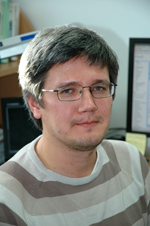 Sasha studied for an MSci in nuclear physics at the Moscow State University in Russia
and made his Ph.D. thesis in theoretical particle physics at the same university. As a
postgraduate student Sasha was a long-time visitor at the European Organization for
Nuclear Research - CERN (Geneva, Switzerland) from MSU and did research on properties of
the Higgs boson and the top quark for the CMS collaboration. Sasha has had postdoc
positions at the University of Cambridge and at the University of Oxford. His main
scientific projects over the last 8 years before transition to bioinformatics were
Monte-Carlo generators of events of elementary particle collisions, large programs used
by particle physicists in search for new elementary particles on huge particle
accelerators such as the LHC at CERN. Apart from an interest in scientific programming
Sasha has always had a strong interest in data analysis techniques, especially in neural
networks and other "soft computing" methods.
Sasha studied for an MSci in nuclear physics at the Moscow State University in Russia
and made his Ph.D. thesis in theoretical particle physics at the same university. As a
postgraduate student Sasha was a long-time visitor at the European Organization for
Nuclear Research - CERN (Geneva, Switzerland) from MSU and did research on properties of
the Higgs boson and the top quark for the CMS collaboration. Sasha has had postdoc
positions at the University of Cambridge and at the University of Oxford. His main
scientific projects over the last 8 years before transition to bioinformatics were
Monte-Carlo generators of events of elementary particle collisions, large programs used
by particle physicists in search for new elementary particles on huge particle
accelerators such as the LHC at CERN. Apart from an interest in scientific programming
Sasha has always had a strong interest in data analysis techniques, especially in neural
networks and other "soft computing" methods.
Sasha joined the Group originally to work on the the study of alternative polyadenylation in Arabidopsis by deep sequencing techniques. This BBSRC funded project was jointly held with Dr Gordon Simpson from the Division of Plant Sciences. However, from from March 2013, Sasha moved onto a new BBSRC funded project to improve and support our web tools: Jpred, Kinomer, Jabaws and TarO.


Sasha joined the Group on 15th May 2010. He moved on to a job with GSK at Stevenage in April 2014. And has since held positions at Data Science companies in the London area. See his LinkedIn profile for full details!
Arranged as a simple Table
|
|
|||
|
|
|||
|
|
|||
|
|
|||
|
|
|||
|
|
|||
|
|
|||
|
|
|||
|
|
|||
|
|
|||
|
|
|||
|
|
|||
|
|
|||
|
|
|||
|
In August 2019 Emily was promoted to Professor of Health Data Science! Emily is currently the CTO of HDR-UKthe UK's national institute for health data science. |
|||
|
|
|||
|
|
|||
|
|
|||
|
|
|||
|
|
|||
|
. |
|||
|
|
|||
|
|
|||
|
|
|||
|
|
|||
|
|
|||
|
|
|||
|
|
|||
|
|
|||
|
|
|||
|
|
|||
|
|||
|
|||
|
|||
|
|||
|
|||
|
|||
|
|
|
||
|
|||
This site was built using the Bootstrap framework.